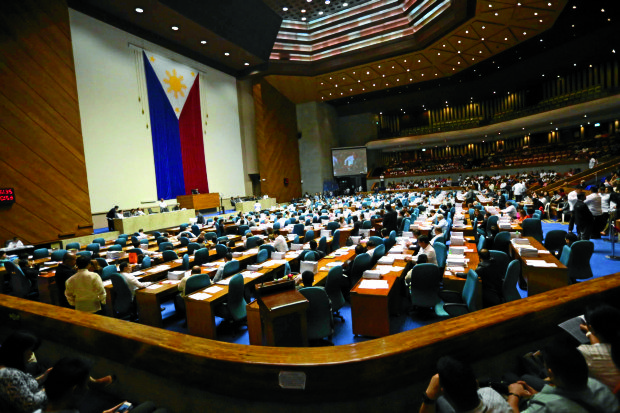House leaders defend work as data show less bills passed

In this March 1, 2017 file photo, the House of Representatives holds a session tackling the controversial death penalty bill on second reading. (INQUIRER FILE PHOTO / JOAN BONDOC)
MANILA — The House of Representatives’ 17th Congress has processed fewer measures every day compared to the first years of the Congresses under the Aquino administration.
But, for Deputy Speaker Gwendolyn Garcia, this should not be used to measure the House’s productivity because the numbers should not be “compared on an apple-to-apple basis.”
“You also have to look at the measures that will be passed,” Garcia said in a press briefing on Monday, where House leaders reported the 17th Congress’ accomplishment.
“Perhaps, what should be looked at is what kind of measures that we passed, whether this be in bills or resolutions, would the resolutions or bills passed have affected a greater number of Filipinos?” she added.
Data from the House showed that for its first year, the 17th Congress processed an average of 13 measures a day. This was less than the averages of 16 and 23 for the first regular sessions of the 16th (2013-14) and the 15th (2010-11) Congresses.
A total of 194 bills were passed on third and final reading for the first year of the 17th Congress, compared to 209 and 256 during the comparable periods for the 16th and 15th Congresses.
Garcia enumerated key bills as follows: free college education, extension of the validity of passports to 10 years, extension of the validity of driver’s licenses to five years, a stricter measure prohibiting the payment of deposits before medical treatment, free irrigation, increase in Social Security System pensions, a national school feeding program, and free public Wi-Fi connection.
Meanwhile, 13 bills have been approved on second reading, which means they have already hurdled the plenary debates and the period of amendments. To compare, the 16th and 15th Congresses ended their first years with 20 and 107 measures close to the last stage of the legislative mill.
Four laws were enacted during the first year of the 17th Congress: the postponement of the barangay and Sangguniang Kabataan elections to October 2017 (Republic Act No. 10923), the 2017 General Appropriations Act (RA 10924), and the renewal of the franchises of GMA Network, Inc., and Smart Communications, Inc., for another 25 years (RAs 10925 and 10926).
However, this was just half the figures posted by the two preceding Congresses for their first sessions: nine from 2013 to 2014, and eight from 2010 to 2011.
Ways and means committee chairman Rep. Dakila Carlo Cua said the 17th Congress’ legislative output “should not only be gauged on the basis of the number of laws that were approved and that became law.”
Cua said the measures pending before the Senate and those pending the President’s signature should also be taken into account.
He also cited “intervening events,” such as Congress’ discussion of the proclamation of Martial Law in Mindanao, which he said affected both chambers’ timelines. “You should approach it holistically, including intervening factors,” he said.
Meanwhile, Garcia denied that the House’s effort to pass the measure reviving the death penalty for illegal drug-related crimes affected the House’s productivity.
“We would say that the passage of the death penalty bill in the plenary is another significant and major stride of the House of Representatives in supporting President Duterte’s campaign against drugs and in supporting the general sentiment of Filipinos,” she said.
For the second regular session of the 17th Congress, Garcia cited several priority measures. Of primary importance would be the 2018 General Appropriations Act and the supplemental budget for the rehabilitation of Marawi City.
Garcia also confirmed that Charter change would be among the priorities. “Federalism, which has been a battlecry of our President even during the campaign days, will be of utmost importance as we focus and we hoped that we can move forward in our efforts at achieving Charter Change,” she said.
Lastly, she cited the measure to grant civil and human rights to civil unions for both heterosexual and same-sex couples.
“This is a changing reality. It has become a growing necessity. This is to promote civil and human rights of same-sex and heterosexual couples who want to live together but are not ready to marry,” Garcia said.
“This is also the reality of our times. There are homosexual couples that will choose to just perhaps stay unmarried but would live together. We need to address the changing realities of our times.” SFM
| 17th Congress | 16th Congrss | 15th Congress | ||
| First Regular Session | First Regular Session | First Regular Session | ||
| July 25, 2016-May 31, 2017 | July 22, 2013-June 11, 2014 | July 26, 2010-June 8, 2011 | ||
| Measures approved | 290 | 354 | 1230 | |
| Enacted into law | 4 | 9 | 8 | |
| Ratified bicameral report | 6 | 4 | ||
| Adopted Senate version | 1 | 1 | 1 | |
| Concurred with Senate amendments | 4 | |||
| On bicam | 1 | |||
| Approved on third reading | 194 | 209 | 256 | |
| Approved on second reading | 13 | 20 | 107 | |
| Adopted resolutions | 67 | 111 | 858 | |
| Measures under calendar of business | 7 | 7 | 110 | |
| Measures consolidated/substituted | 557 | 430 | 372 | |
| Referral of resolutions on inquiries | 393 | 345 | ||
| Total measures processed | 1247 | 1136 | 1712 | |
| Total number of session days | 97 | 69 | 73 | |
| Average number of measures processed per day | 13 | 16 | 23 | |
| SOURCE: HOUSE OF REPRESENTATIVES | ||||